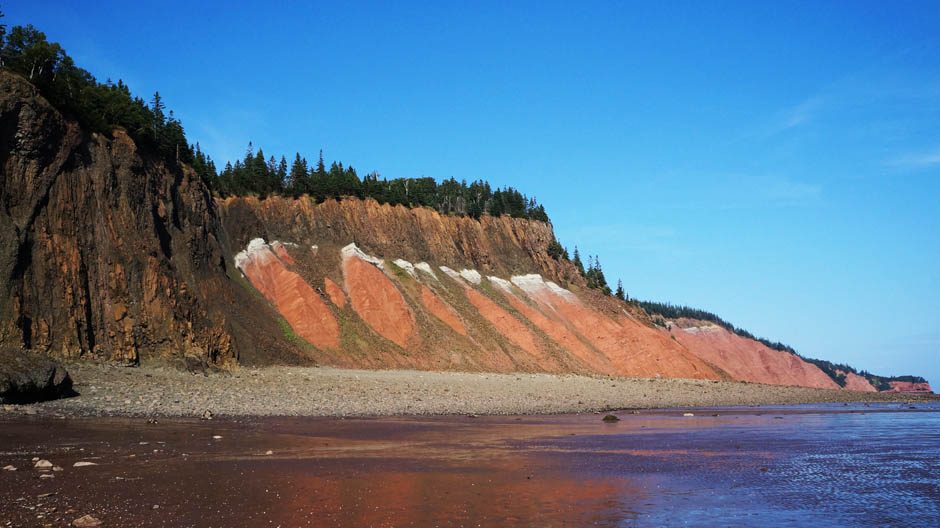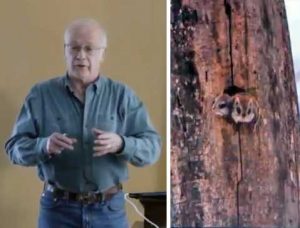In late June/early July, CBC Information Morning conducted four interviews related to Western Crown lands issues which had precipitated the Independent Review (see links).
Below is an ‘abbreviated transcript’ of the interview with Bob Bancroft.
Intro: Stephen McNeil announced a review of the provinces forestry practices during the election campaign in May. He said it would be completed by September. Yesterday DNR Minister Margaret Miller announced that the review will be headed by former Deputy Environment Minister Bill Lehey and it will be completed by the spring. Bob Bancroft is a wildlife biologist and was one of the authors of the provinces last forestry review in 2011
DC: Good morning Bob, what do you think of the choice of Bill Lehey to run this review?
BB: He is a very intelligent man, a lawyer… very capable, but if this was the health care system we were talking about would we think that hiring that hiring somebody with no experience in health care to come up with a set of recommendations for change in about 6 month would be feasible?
DC: He did the report on aquaculture, so he might understand the process and know who to talk to.
BB: He is a capable independent thinker. The economic side he could get a hold on if DNR will give him the figures. But the forest ecology side is a point of contention that a lot of people have a difficulty to grasp beyond recognizing that something is wrong with a large clearcut. Once you get into the nuances you have both sides of this saying they have science on their side. The overall conclusion that voluntary planning came to was that current practices are not sustainable. We have Margaret Miller saying sustainable management is vitally important to all Nova Scotians, but the situation has actually got worse in terms of the forest and the wildlife that I am most concerned about.
I would say we have unrestrained, government sanctioned forest liquidation on most of our public lands now and since that voluntary planning report was out we have added the whole business of burning forest biomass to produce electrical energy.
DC: When you were involved in 2011 it was a panel, is that the case now?
BB: From what I understand, he is going to review the practices and evaluate market access for private woodlot owners . He will be supported by technical experts and other resources…I gather he can call on who he wants but he is still president of Kings College and it is a very tight timeline.
DC: When you look at the symptomatic issue of clearcutting, the government backed away from the promise to reduce it by 50%. Are you concerned that is symptomatic of what the government’s priorities should be [between] jobs, biomass and environment?
BB: I think the environment is taking a back stage to the dwindling forest economy, and the forest quality is being foregone for a few jobs… we have mature yellow birch and sugar maple, young oak being cut down. When I asked the Associate Deputy Minister what is happening to them, he said they are being chipped for OSB strand board and being shipped away. That is low end value for trees that have much greater potential.
When I was on the panel, it took us a year and a half, Constance Glube, Joe Marshall and Alan Shaw headed the thing up and we made a lot of recommendations that were not taken seriously, in fact the industry hired Dr Robert Wagner from Maine to discredit it and the result was that woodlot owners were scared into not wanting to change their approach to woodlot management.
DC: When the province acquired lands in SW Nova Scotia, the Bowater lands, there was talk about sustainable development within the forest, value added, creating jobs on a smaller scale, that you would have community involvement in decision-making. Is that going on?
BB: No. We have the Medway Community forest but they didn’t get the land base they asked for, and the statistics that I have indicate about 75% of the land base that they did get, which was inadequate to sustain them at the start, had been clearcut in the last 35 years.
So No. A lot of people feel that Crown land is publicly owned land and should be subject to a variety of uses. Instead it is being single-mindedly handed over to people who are going to make profits using the cheapest way they can to extract the wood.
DC: I think the argument on the industry side is that these are difficult times, and those jobs, particularly in rural NS, are critical to the survival of communities and we are willing to let you chip some forest if it means some jobs will be here when we wake up in the morning.
BB: They have taken away the right of local communities to have much say in forest management. The truckers and the heavy machinery operators are the only ones there…it’s a dwindling thing. Thinking in the woods is something we need to get back to… we are stripping what’s there, this is wildlife habitat, the streams dry up after clearcuts, we lose nutrients, a lot of our soils are very vulnerable in NS.
I wish William Lehey a very good review but I don’t think he will get to the bottom of some very important issues that have been going on for a long time and that are degrading our environment.
LINKS
Independent Review of forestry in Nova Scotia finally announced
Post on this website, Aug 31, 2017
CBC Information Morning Interviews
June 28, 2017: CBC InfoA.M attempts to sort out issues between smaller private owners and operators and the WestFor consortium – #1 Private Operator
June 29, 2017: CBC InfoA.M. attempts to sort out issues between smaller private owners and operators and the WestFor consortium – #2 WestFor responds
Natural Resources Strategy
A Natural Balance: Working Toward Nova Scotia’s Natural Resources Strategy
Report of the Steering Panel Phase II, Natural Resources Strategy • April 2010 By Hon Constance Glube, Joe Marshall, Allan Shaw
Restoring the Health of Nova Scotia’s Forests: A PANEL OF EXPERTISE REPORT ON FORESTS TO THE STEERING PANEL
By Bob Bancroft and Donna Crossland, 2010
Natural Resources Strategy – Supporting Documents
All documents related to the Natural Resources Strategy
Also see items under Perspectives on this website.
—-
Tip of the hat to RP for forwarding info about the interview with Bob Bancroft
RP also directed me to this CBC story, which relates to the rural employment issue raised by Connelly towards the end of the interview with BB:
Low wages driving tree planters out of province, say contractors
Silviculture workers met with premier this summer to push for higher rates
By Emma Smith, CBC Posted: Aug 29, 2017
SOME DISCUSSION followed shortly after this post, some excerpts:
X1: Bob…You suggest that chipping ‘good’ hardwood for OSB delivers “low-end value for trees that have much greater potential”…The unfortunate fact is that, as I learned as part of the Forestry Lab’s ‘merchandizing yard’ team, along with the continuing decline in our traditional wood and fibre markets (hurricane bumps notwithstanding), the contracting forest sectors in other eastern provinces (and states) have (1) more excess capacity; (2) ‘better’ mixed forests and (3) closer large markets. Non-commodity NS wood processors will remain marginal players beyond local markets.
So, Bob, unless you can demonstrate where large new demand will come for Lloyd’s ‘under-exploited fibre basket’, I suggest that clear-cutting volumes are no longer the biggest issue going forward. In my view, these include:
(1) why, at a time when woodlot owners, in SW Nova in particular, lack buyers, doesn’t the Province ‘require’ the consortium to draw more from private operators?;
(2) what will the forestry review say about the management and regulation of private woodlands, which account for the majority of harvests and clear-cuts?; and
(3) what future markets (and hence potential forest stress) will there be to sustain (term intended) non-coastal (fisheries, tourism, etc) communities across the province?
X2, responding to X1: The difficulty with “clear-cutting volumes are no longer the biggest issue going forward” is that there is a lot of pressure to clearcut for biomass and the like and the government has invested in and promoted that avenue; also a high level of clearcutting continues on land that has been largely clearcut already, so the pressure on the “available” land is still high. Taking the last XXX tonnes from the cod fishery had far far greater impact than taking the same amount even 5 years earlier.
X1: At the moment, large-scale biomass for electricity is frowned upon and bio-diesel is too pricey (Cellufuel, etc), but that could change.
That is why I have long argued for addressing the industrial policy cause of fibre demand (trade-action-drawing government subsidies and concessions) instead of the symptom (intensive forest ‘management’).
All stripes of government (except John McDonnell) have put jobs before trees, and will continue to do so if ‘opportunities ‘ arise.

